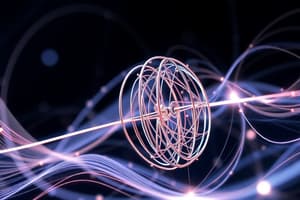Podcast
Questions and Answers
Which branch of physics deals with the motion of macroscopic objects?
Which branch of physics deals with the motion of macroscopic objects?
- Thermodynamics
- Classical Mechanics (correct)
- Quantum Mechanics
- Electromagnetism
Which of the following is NOT a fundamental force in physics?
Which of the following is NOT a fundamental force in physics?
- Weak Nuclear Force
- Gravity
- Electromagnetism
- Friction (correct)
What is the study of the relationships between heat, work, and other forms of energy called?
What is the study of the relationships between heat, work, and other forms of energy called?
- Kinetics
- Electromagnetism
- Optics
- Thermodynamics (correct)
Which of these branches of chemistry focuses on the study of carbon-containing compounds?
Which of these branches of chemistry focuses on the study of carbon-containing compounds?
What term describes the process of atoms bonding together to form molecules?
What term describes the process of atoms bonding together to form molecules?
Which of these is NOT a type of chemical bonding?
Which of these is NOT a type of chemical bonding?
What branch of chemistry deals with the identification and quantification of matter?
What branch of chemistry deals with the identification and quantification of matter?
What is the study of chemical processes occurring in living things called?
What is the study of chemical processes occurring in living things called?
Which of these is NOT a key area of study within Biology?
Which of these is NOT a key area of study within Biology?
The branch of biology that deals with the study of the diversity of life is known as:
The branch of biology that deals with the study of the diversity of life is known as:
Flashcards
Physics
Physics
The natural science studying matter, motion, energy, and forces.
Classical Mechanics
Classical Mechanics
Branch of physics focusing on the motion of macroscopic objects using Newton's laws.
Thermodynamics
Thermodynamics
Study of heat, work, and energy relationships in physical systems.
Electromagnetism
Electromagnetism
Signup and view all the flashcards
Optics
Optics
Signup and view all the flashcards
Modern Physics
Modern Physics
Signup and view all the flashcards
Chemical Bonding
Chemical Bonding
Signup and view all the flashcards
Stoichiometry
Stoichiometry
Signup and view all the flashcards
Acids and Bases
Acids and Bases
Signup and view all the flashcards
Biology
Biology
Signup and view all the flashcards
Study Notes
Physics
- Physics studies matter, motion, behaviour through space and time, and concepts like energy and force.
- Branches include classical mechanics, thermodynamics, electromagnetism, optics, and modern physics (relativity, quantum mechanics).
- Classical mechanics uses Newton's laws and energy conservation for macroscopic objects.
- Thermodynamics relates heat, work, and other energy forms.
- Electromagnetism describes electric and magnetic interactions.
- Optics studies light behaviour (reflection, refraction, diffraction).
- Modern physics explores atomic and subatomic phenomena (quantum mechanics, relativity).
- Fundamental forces are gravity, electromagnetism, strong nuclear, and weak nuclear forces.
- Key concepts include motion, force, energy, momentum, and angular momentum.
- Mathematics is crucial for describing and analyzing physical phenomena.
Chemistry
- Chemistry investigates matter's composition, properties, and reactions.
- It examines atoms, molecules, and their interactions.
- Key branches are organic (carbon compounds), inorganic (non-carbon), physical (chemical processes), analytical (identifying matter), and biochemistry (biological processes).
- Atoms, molecules, ions and their properties are vital.
- Chemical bonding (ionic, covalent, metallic) explains how atoms link.
- Chemical reactions involve changes in substance composition through bond breaking/forming.
- Stoichiometry measures reactants and products in reactions.
- Acids, bases, and salts affect reactions and pH.
- Solutions (homogenous mixtures) are important.
- Chemical kinetics studies reaction rates, and equilibrium describes final states.
Biology
- Biology studies life and living organisms.
- Topics include cell structure/function, genetics, evolution, ecology, and life diversity.
- Cell biology analyses the fundamentals of the cell.
- Molecular biology studies biological molecules.
- Genetics investigates heredity and variation.
- Evolutionary biology explores life's development and diversity.
- Ecology studies organism-environment interactions.
- Physiology examines physical/chemical processes within organisms.
- Organismal biology examines individual organism structure/function.
- Life diversity encompasses prokaryotes, eukaryotes, and many species.
- Key biological processes involve metabolism, reproduction, development, and adaptation.
- The scientific method is used in biological research.
Studying That Suits You
Use AI to generate personalized quizzes and flashcards to suit your learning preferences.




